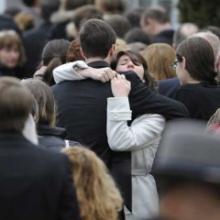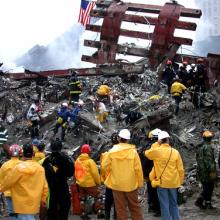God
It's the Monday after Easter, and I couldn't think of a better day to talk about God being with us. Adam Ericksen wrote about the dance of doubt and faith on Good Friday, the challenge and beauty of embracing the fullness of the journey. Rob takes that all one step further in this chapter: With.
There is, I believe, another way to see God, a way in which we see God with us— with us, right here, right now. This isn’t just an idea to me; this is an urgent, passionate, ecstatic invitation to wake up, to see the world as it truly is.
(Kindle Locations 1201-1203)
Suddenly I have “Right Here, Right Now” by Jesus Jones playing in my head. Excuse me for being a child of the 80s.
My take-away? This God doesn't choose sides like we do.
We are offered a significant choice, namely between two ways of being human. The difference between logical necessities or physical necessities and vital necessities is made clear in that in the latter we have the possibility of refusing ‘to turn away from a disaster’ – we can in fact choose a lesser way of being human over a fuller way. What is at stake in the necessity of cry is one’s own humanity, the meaning of one’s own existence, and to turn away from crying is to turn away from decision and responsibility. This is to deny the very possibility of becoming genuinely human.
This letter was written on a plane a week ago. I posted it originally on Facebook as a status update. Out of curiosity I took a gander at it again and decided I wanted to share it here. Things are so fluid on the Ol' F-Book that I thought keeping it here would be good to do. Rob's new book, What We Talk About When We Talk About God, offers someting new and something familiar all at once. What I think Rob is doing is not so much giving us new ideas (though, given some of the ecclesial silos many of us have been reared in some of these ideas might seem new). Instead, Rob is lending his voice to many Christians. His pastorally framed theology is just the kind of thing many people have been clamoring for these last several decades. My grandparents would have loved his new book. So would have their parents. I kid you not.
This book is not about a "new" thing. It's simply about God and how we come to know God in this world.
I love Peter Rollins' honesty about his dark night of the soul.
He's popularized a term for the intellectual position accompanying the dark night of the soul: a/theism. I interpret Peter's thought as being in relation to an experience of God's absence. [Note: corrected this paragraph's content from "even coined" to "popularized. Turns out another author coined a/theism."]
I thought it was hilarious that Tony Jones challenged Peter to give up atheism for Lent on the Homebrewed Christianity podcast.
But I took it seriously when Micah Bales, one of my best friends, wrote a post challenging Peter Rollins' Atheism for Lent. You can't give up God because God is a felt presence. (Peter later responded to Micah. And Brian Merritt a piece about who Micah is.) Our conversations got me thinking about what I value about Peter Rollin's voice and what I might challenge about a/theism as I understand it. In order to talk about why a person believes or disbelieves in God, you have to talk about a personal spiritual journey.
“Oh, God!”
That cry has echoed ever since news of the horrific shooting at Sandy Hook Elementary School in Newtown, Conn.
As the names of those who died are made known, that cry is followed by a question: Why? Why does God allow evil?
This agonizing question arises among religious believers after tragedies great and small. It’s also one that priests, pastors, rabbis, and imams will wrestle with.
The Rev. Jerry Smith of St. Bartholomew Episcopal Church in Nashville said that although this weekend marked the third Sunday in Advent, which focuses on hope in advance of Christmas, the church also has to talk about the reality of evil.
“We have to speak about this shooting and we have to recognize, this is the very darkness that Christ came into the world to dispel,” Smith told The Tennessean.
The Rev. Neill S. Morgan, pastor of Covenant Presbyterian Church in Sherman, Texas, says on the congregation’s website that now is a time for prayer.
But, says Morgan, “all the existential questions about God, justice, and love” will come. “We wonder what we can do to prevent such violence in the world, our nation, and our community.”
One commentator suggested that it was precisely because God was not there that this heinous act happened. Gov. Mike Huckabee claimed we should not be surprised to see this kind of violence since we have removed God from our schools and our society. His sentiment is to say, “God is NOT here.” If that is the case, then it surely can explain the existence of pure evil that we saw displayed on Friday.
However, thinking like that of Gov. Huckabee suggests that we somehow have the power to remove God from our schools and our society. This kind of God is quite small, weak, and impotent — one that is dictated by the mere whims of humanity. This is not the God of whom Matthew spoke.
Matthew spoke of the Almighty God fully embodied and revealed in the person of Jesus. So much so that he claimed he was Immanuel: God with us. He is here not in spite of the pain, nor did he come to explain it away. God is here in the midst of our suffering.
The hope of Advent is that God responded to the suffering of humanity by entering into it with us. He did not stand outside of it and look in with a wincing face and hope that everything would somehow work out. Nor did he see humans who removed him from their schools and societies and say, “Well fine, then, have it your way!” Not at all.
Advent suggests so many mysteries of God's patience. One rarely commented case is God as Father and embryo. It is extra Biblical so imagination can only begin to tell the bizarre tale. Gabriel's annunciation and appearance to Joseph begins the period of waiting and soul searching, but a remarkable gap exists in the Advent story. Luke 1:56 makes this cursory remark as though it would suffice:
Mary stayed with Elizabeth for about three months and then returned home.
Presumably the second trimester of Mary's pregnancy is treated with a passing reference. If we simply take the divine conception of Jesus at face value, there was a moment in human history where God existed as Father in the heavens and embryo in Mary's uterus. Paradox of paradoxes. The Creator in utero.
Up-and coming-/singer-songwriter Noah Gundersen stopped by the Sojourners office to talk with our Brandon Hook about music, his new album Family, God, and creativity.
The Seattle-based folk artist was recently featured on Spotify’s Emerge app, which pits rising artists against each other based on play frequency, and is currently on a U.S. tour.
Special thanks to Noah for stopping by and being so open with us!
NEW YORK — In the afterglow, I give thanks for Thanksgiving Day.
It might be our most spiritual holiday, dealing as it does with that most spiritual of experiences: feeling gratitude.
Despite the commercial drumbeat for the aptly named "Black Friday," Thanksgiving Day itself tends to be about family, food, and free time. On Facebook, people shared recipes for stuffing, answered questions posed by nervous first-time cooks, told stories about traveling to be with family, and flooded the web with photos of people just being together.
I realize that those are ambiguous realities. Not everyone is blessed with healthy families, not everyone has enough food. Many work hard to prepare food and cheer for others to enjoy. But the promise is there — and unlike the promise of material hyperabundance that has come to dominate Christmas, the promise of Thanksgiving Day seems worth pursuing and attainable.
How is it possible that the creative life can feel simultaneously self-giving and narcissistic? On the one hand, the artist, or musician, or writer has a gift that not everyone has. And because paintings and songs and books give other people great joy – and might even change their lives — those gifts must be shared. But that means the artist herself must be shared, and that’s the problem.
For the artist, self-expression is unavoidable – it is part of the job description. As a songwriter, my raw material is the world as I observe it. That’s all I’ve got. The most realistic painter or sculptor still has to rely on his own vision. Even as a journalist, I have to draw upon my five senses, my own mind and my own experiences. Even as I tell someone else’s story, it is in part my story. I can’t tell your story without filtering it through my story; it’s how we make sense of new information. I’m only human, after all.
In search of a story that will “make you believe in God?”
It’s a heavy undertaking. Kind of like trying to adapt that story to film, as screenwriter David Magee and director Ang Lee did brilliantly in Life of Pi, which opens nationwide today.
The film, adapted from Yann Martel’s moving book, takes on massive questions — who is God, how do we find God, and why do bad things happen to us — as we follow Pi, a zookeeper’s son shipwrecked on a lifeboat with a Bengal tiger.
“I think we’re humble filmmakers — I don’t think we can answer why bad things happen to people,” Magee told Sojourners Tuesday. “But I do think it puts into perspective the fact that within every ordeal there is a lesson.
“This is very much a story about storytelling,” Magee added. “It’s very much a story about how those different narratives help us get through. It can’t promise to answer why we go through the things we do, but it can say what we take away from them.”
"Do you think he'll sing?" the girl in the row behind me wondered aloud.
"I hope so," the young fellow beside her said before continuing, "My dad would freak. He was a big fan of U2 when I was growing up. He used to play this one album, The Joshua Tree, over and over again."
His father was a fan.
I am a thousand years old, I thought to myself, as more Georgetown students filled the seats around me at the university's 111-year-old Gaston Hall, the main lecture hall on campus named after Georgetown's first student, William Gaston, who later served as a member of the U.S. Congress.
The hall, decorated with stunning art-deco-era frescos and the crest of every Jesuit institute of higher learning, has hosted many dignitaries over the years, including Presidents Obama and Clinton, Vice-President Al Gore, Secretary of State Hillary Rodham Clinton, and Supreme Court Justice Antonin Scalia, to name but a few.
"So if he's not going to sing, is he just going to talk," another student asked, with a distinct whiff of disappointment in his voice.
"I hear he's an awesome speaker, though," still another student said.
The students who packed the auditorium, many of them from Georgetown's Global Social Enterprise Initiative at the McDonough School of Business and more than a few donning black t-shirts with the insignia of the ONE Campaign (of which Bono is a co-founder), weren't sure what to expect from the famous Irish rock star and humanitarian.
A concert? A lecture? Another boring speech?
I'm fairly certain none of the students present for Monday night's event, sponsored by the Bank of America and The Atlantic magazine, anticipated hearing Bono, the 52-year-old lead singer of U2, preach.
But preach he did.
Some crazy faces, hilarious animal photo bombs, awesome music at NPR and KEXP, God in Golf (in a good way), and Sojourners' very own Alycia Ashburn (talking Creation Care with the people at OnEarth). Awesome links for an awesome day!
What do you have to say about "living abundantly"? How do you deal with anxiety when you think about the future of churches?
“Very truly, I tell you, anyone who does not enter the sheepfold by the gate but climbs in by another way is a thief and a bandit. The one who enters by the gate is the shepherd of the sheep. The gatekeeper opens the gate for him, and the sheep hear his voice. He calls his own sheep by name and leads them out. When he has brought out all his own, he goes ahead of them, and the sheep follow him because they know his voice. They will not follow a stranger, but they will run from him because they do not know the voice of strangers.” Jesus used this figure of speech with them, but they did not understand what he was saying to them. So again Jesus said to them, “Very truly, I tell you, I am the gate for the sheep. All who came before me are thieves and bandits; but the sheep did not listen to them. I am the gate. Whoever enters by me will be saved, and will come in and go out and find pasture. The thief comes only to steal and kill and destroy. I came that they may have life, and have it abundantly.
~ John 10:6-10
A couple days ago I called my friend Kae so we could talk about this Gospel reading where Jesus takes a child in his arms and teaches the disciples that if they welcome a child in his name they welcome God. And we started talking about the actual reality of children and how difficult small ones can be to manage. Kae told me of this brilliant technique she employs when dealing with toddlers.
She said it really helps her to be patient and compassionate with defiant, emotional, snot-faced toddlers when she just thinks of them like little versions of really drunk friends. Then when they keep falling down and bumping into things and bursting into tears she just treats them like she would a friend who is too drunk to know what they are doing, and who you just try and make sure doesn’t hurt themselves, and who you clean up bodily fluids from, and make sure they drink some water, and then just lovingly change them into their pajamas and tuck them into bed.
Children are really a mess.
We’ve all heard the rhetoric. “We need to take America back for God!”
Why? Supposedly so we can regain some bygone level of ethics or moral standards. Supposedly, if we don’t, God will get tired of us “rebuking” God and remove God’s hand of protection from us. Supposedly, so God won’t test us or judge us or something.
Yet, as Gregory A. Boyd notes in his important book The Myth of a Christian Nation: How the Quest for Political Power Is Destroying the Church, taking America BACK for God assumes we were at one really belonged to God, followed God, listened to God. Boyd goes on to ask, when was this glorious age in the history of the USA?
Let’s start way back. We’ve been taught that many people migrated to North America for religious freedom. So was this glorious time when some of our forebears imprisoned, tormented, and/or hanged many suspected to be witches? Is that what so many want to take us back to?
Cheerleaders at an East Texas high school are fighting their school district’s orders to stop using Bible quotes on their signs at football games.
In August, cheerleaders at Kountze High School, a school with fewer than 500 students 30 miles north of Beaumont, Texas, began painting Bible verses on large paper signs football players burst through at the beginning of games.
But this week, Kountze Independent School District Superintendent Kevin Weldon called for an end to the banners after consulting with a legal adviser at the Texas Association of School Boards.
“It is not a personal opinion of mine,” Weldon told KHOU, a Houston television station. “My personal convictions are that I am a Christian as well. But I’m also a state employee and Kountze ISD representative. And I was advised that such a practice would be in direct violation of United States Supreme Court decisions.”
That prompted the cheerleaders and their supporters to launch a Facebook page, “Support Kountze Kids Faith,” which attracted 34,000 members in its first 24 hours — more than 10 times the population of Kountze.
Parents of at least three cheerleaders have hired an attorney and are considering suing the school district.

Photo via Anthony Correia / Shutterstock.com
Good and gracious God,
Today we come before you with heavy hearts
as we remember the events of 9/11.
For some of us today is a mixed bag of emotions.
We hurt deeply for those who lost their lives
and those who lost their loved ones.
We mourn the nearly 3000 who died that day.
We are humbled by the bravery of the first responders.
We continue to grieve with our neighbors
in the loss of our national innocence -
our false sense of constant safety.
Out of the chaos, to the rhythm of the Lord’s Prayer, John Mahony, a retired U.S. Army colonel who was managing projects for Blue Cross/Blue Shield, sensed something that reminded him of when his mother would wrap him up as he’d climb out of a cold swimming pool, and he would be held, safe and warm, in loving arms.
“As I walked down that stair, somewhere between the 12th floor and the 10th, somewhere between ‘Our Father’ and ‘Thy will be done,’ that same feeling came over me," Mahony said. "Suddenly, I was wrapped in warmth, and love, and comfort. In that smoky, wet stairway, in a burning building, surrounded by a thousand frightened people; I felt wonder. I felt God’s peace, and I knew that regardless of the physical outcome, everything would be all right.”
I was home sick on Sept. 11, 2001. Amy had left for her grad school classes, so I was a little bit annoyed when she burst back in and woke me up.
“Turn on the TV,” she said. “Something bad is happening. Really bad.”
While watching the replayed video of the plane colliding with the first tower, the second tower attack came. And then there were the reports of similar attacks at the Pentagon and in Pennsylvania. At that moment, we had no idea when the bad news would stop coming. My first thought was for those loved ones I have in bigger cities, praying that they would not find themselves in harm’s way.
We watched the reports in silence for a few hours, trying to sort out what had just happened. Of course, there were no certainties about the attacks being over, but by now all planes had been grounded, and the American military was on high alert.
“I’m not sure how much more of this I can watch,” I told Amy, realizing it was nearly noon, and I was still sitting on the couch in my underwear. “We should try and do something.”
“Everything is closed,” she said. “Churches will probably have prayer services later, but not until tonight.” The zoo was the only thing we could find that was still operating, so we decided to go spend some time among some less self-destructive animal species. We settled by the gorilla habitat, where one lazy silverback leaned against the other side of the glass, just inches away from us. Though they usually tend to turn their backs to human observers, he was staring right at us. He seemed to be just on the verge of speaking:
What the hell is the matter with you people?













